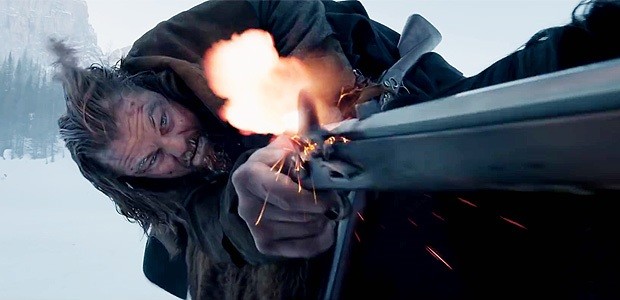Evidently, director Alejandro González Iñárritu is not one to rest on his laurels. Having won last year’s Best Picture and Best Director for Birdman, I can’t even imagine what sort of pressure Iñárritu underwent to remain consistent but it shows. Painstakingly crafted and expertly told, The Revenant is a visceral engagement of the senses unlike anything we have seen from the director.
Co-scripted by Iñárritu, this partly based true story tells of frontiersman Hugh Glass (Leonardo DiCaprio) and a group of fur trappers set in the icy wilderness of 1820s South Dakota. In a breathtaking opening montage, Glass and his hunting party are ambushed by Native-American Arikara Indians. Outnumbered and chased by the Arikara, the group decides to return to base with Glass being the navigator. Expedition member John Fitzgerald (Tom Hardy) disagrees with the plan and an instant enmity is born. Between increasing hostility on their way back, Glass is attacked by a grizzly bear in what has to be one of the most brutal, terrifying and uncut scenes in a film. Having barely survived the attack, and certain that Glass won’t make it back alive, Captain Andrew Henry (Domhnall Gleeson) orders Fitzgerald to lead the expedition back. Glass’s half Native-American son Hawk (Forrest Goodluck) and another young man Bridger (Will Poulter) are tasked with staying behind and ensuring a proper burial. But when Fitzgerald volunteers to stay behind too, it’s obvious to the viewer that no good deed can come from this. Thus begins a traumatic tale of survival but also revenge when Glass learns of Fitzgerald’s heinous intentions.
At little over 150 minutes, this is a long film and not for everyone. From cauterizing his wounds to what Glass must do to survive, Iñárritu’s remarkable achievement in this film is his relentless method of conveying the unthinkable. Between extreme cold conditions and eating raw meat, this is DiCaprio in his most challenging delivery. And although he doesn’t say much, his role is physically demanding to such an extent they might as well hand him an Oscar for exhibiting a genuine impetus to do just about anything. But DiCaprio is just one component in an overall strikingly beautiful film.
While the production quality and audio-visual experience is consistently mind-blowing, it comes down to Emmanuel Lubezki’s cinematography as the single most significant aspect of this film. From tracking shots of landscapes to a character’s widening pupils by a camp fire, the soul of this film is undeniably in its visual appeal. Such is the astounding nature of his shots that the only other way to describe it is as if the lens is omnipresent. After consecutive Academy Awards for Gravity and Birdman, it won’t be surprising if Lubezki is in for a hat-trick.
As Iñárritu’s most ambitious film, The Revenant doesn’t disappoint and even with its somber tone and length, there isn’t a single dull moment. If anything, the entire film is an exhaustive experience but positively riveting, terrifying, and haunting – like something that has returned from the dead and won’t go back.
Rating: 




